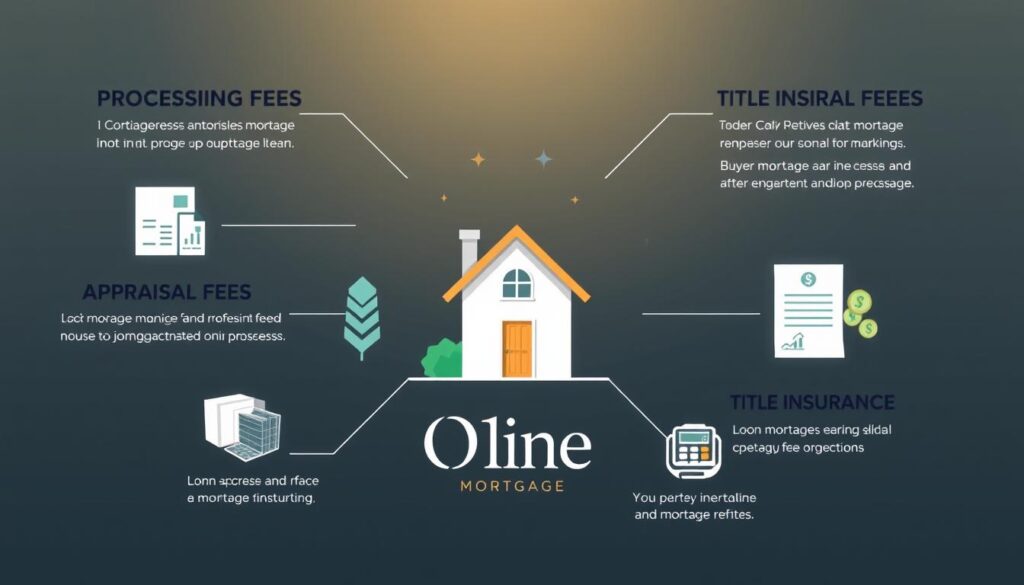As we navigate the complexities of real estate transactions, understanding the intricacies of closing costs is indispensable for both homebuyers and sellers. These are the final hurdles before you claim the keys to your new home. Beyond the initial down payment, an array of additional expenses come into play—expenses that can catch many first-time homebuyers by surprise. Typically, these closing costs range from 3% to 6% of your mortgage loan amount, shaping the final settlement in ways that can affect your financial planning. It’s not just about how much you pay, but also about when, how, and to whom these costs are allocated. Let’s demystify these costs and prepare ourselves to make informed decisions in our home-buying journey.
- Closing costs include a variety of fees beyond the down payment, crucial in finalizing a real estate transaction.
- The total closing costs often account for 3% to 6% of the mortgage loan amount.
- Being informed about these costs is vital for homebuyers to budget effectively.
- Both buyers and sellers have room to negotiate these costs, though traditionally buyers cover the majority.
- A clear grasp of closing costs is a critical step in ensuring a smooth and transparent mortgage process.
Demystifying Closing Costs in Real Estate Transactions
When navigating the world of real estate, understanding the intricacies of closing costs is essential for both buyers and sellers. These costs encompass a variety of fees associated with finalizing a property sale, making them a crucial part of the transaction process.
The Composition of Closing Costs
Closing costs are the fees and expenses that buyers and sellers need to pay at the end of a real estate transaction aside from the price of the property. One of the key components is the home appraisal, a necessary evaluation to establish the property’s market value and ensure the mortgage amount requested is appropriate. Title searches are another vital aspect, confirming the seller’s legal right to transfer ownership. Whether these costs fall to the buyer or the seller can depend greatly on the loan type chosen and the agreed terms of sale. Additional fees often included are settlement charges, which cover the administrative and legal costs of finalizing the real estate transfer.
Why Closing Costs Are Essential for Homebuyers and Sellers
Closing costs serve multiple purposes and benefit all parties involved by facilitating a smoother transaction process. They include essential services like escrow accounts, which safeguard the funds needed for property taxes and homeowners insurance, ensuring these expenses are managed efficiently and without lapse. Moreover, seller concessions can play a pivotal role in negotiations, potentially covering a portion of the buyer’s closing costs and resulting in a mutually beneficial outcome. Understanding the breakdown of these costs and how they relate to the specific loan type and property being purchased is fundamental for a successful real estate deal.
Each of these components not only protects but also benefits the buyer and seller, ensuring transparency and fairness in the financial aspects of the transaction. As such, comprehending the details and significance of closing costs is indispensable in the realm of buying or selling property.
Typical Expenses Included in Closing Costs
When navigating the home-buying process, understanding the typical expenses involved in closing costs is essential. These costs can vary but generally include several key fees that both buyers and sellers must consider.
Primarily, application fees are charged by lenders to process your loan application, a necessary step to secure financing for your home purchase. Similarly, attorney fees cater to the legal aspects, ensuring all paperwork is correctly handled and legally compliant. Moreover, courier fees can accrue as documents must be transported securely between parties to finalize transactions quickly. Lastly, credit reporting fees are incurred when lenders check your credit history to determine your loan eligibility and interest rates.
- Application Fees: Necessary for loan processing.
- Attorney Fees: Essential for legal verification and document preparation.
- Courier Fees: Covers the cost of fast document delivery.
- Credit Reporting Fees: Required to access your credit score and history.
| Expense Type | Description | Average Cost |
|---|---|---|
| Application Fees | Charges for processing your mortgage application. | $200 – $500 |
| Attorney Fees | Legal fees for document review and representation. | $500 – $1,000 |
| Courier Fees | Costs to expedite document delivery. | $50 – $100 |
| Credit Reporting Fees | Fees for accessing detailed credit reports. | $30 – $50 |
In essence, understanding these fees helps buyers and sellers prepare financially and strategically for successful real estate transactions. Awareness of these costs not only aids in budgeting but also in negotiating terms that can potentially minimize out-of-pocket expenses.
Closing Costs
Understanding the landscape of closing costs can greatly affect your experience as a homebuyer or seller. Let’s delve into the specifics of these expenses which vary significantly across the country and are influenced by factors like state regulations, the nature of the property deal, and market conditions.
Breakdown of Mortgage Fees and Settlement Charges
Mortgage fees primarily consist of origination fees and discount points. The origination fee is charged by lenders to process new mortgage loans, which can vary but typically runs about 0.5% to 1% of the loan amount. Discount points are prepaid interest that buyers can purchase upfront to lower their mortgage rate. Moreover, settlement charges include escrow funds, which are monies set aside to cover future property taxes and homeowners insurance, and FHA mortgage insurance, required for FHA loans to protect lenders against losses if a borrower defaults.
Average Closing Costs Across the United States
The average closing costs, including state-by-state closing costs, reveal significant variance based on geographical location. For instance, regions with higher average home prices tend to have higher closing costs. Transfer taxes—taxes imposed by states, counties, and municipalities on the transfer of the title of real property—also play a crucial role in these costs. To provide a clearer picture of this variance:
- Washington D.C. remains one of the most expensive areas, with average closing costs amounting to around $29,888.
- On the other hand, Missouri offers one of the lowest in the nation at approximately $2,061.
Whether you are buying a home in Missouri or Washington D.C., understanding these fees and preparing for them can lead to a smoother transaction and no surprises during the mortgage process.
Understanding Mortgage Fees and Their Impact
When navigating the complexities of acquiring mortgage loans, understanding the variety of fees involved is crucial. These fees not only affect the total cost of the loan but also influence monthly payments and overall affordability.
Role of Origination Fees and Points in Mortgages
Origination fees are crucial components charged by lenders as part of lender administrative costs. These fees compensate for processing the loan application, underwriting, and funding the loan, typically amounting to 1% of the total loan amount. Adding to the upfront costs are discount points, which are voluntarily purchased by the borrower to lower the interest rate on their mortgage loans. Each discount point, representing 1% of the loan amount, directly reduces the interest rate, thus influencing long-term payment schedules and interest accrual.

Recurring Costs Beyond the Mortgage: Insurance and Taxes
Aside from initial mortgage fees, homeowners must also budget for recurring annual expenses, which include property taxes, homeowners insurance premiums, and potentially mortgage insurance. Property taxes are determined based on the assessed property value and vary widely across different regions. Homeowners insurance covers potential damage to the property, while mortgage insurance is generally required when down payments are less than 20%. These not only protect the property and lender’s investment but also add a significant amount to the monthly expenditures of owning a home.
Understanding these costs is essential for potential homeowners to prepare financially for the responsibilities of owning a home beyond just repaying the mortgage loan itself.
What Buyers and Sellers Need to Know About Settlement Charges
In any real estate transaction, understanding the specifics of settlement charges is crucial for both buyers and sellers. For buyers, the journey begins with receiving a loan estimate, which outlines the expected costs involved in the mortgage process. This is usually provided early during the mortgage application. Conversely, the closing disclosure, received three business days before closing, finalizes those details, ensuring there are no surprises on closing day.
Sellers are not left out of the equation. They generally need to handle commissions and might also share some of the transfer taxes, depending on local practices. The transparency and timing of these disclosures are not just a courtesy but are legally required to ensure both parties are informed and confident in the transaction.
- Loan Estimate: Early outline of mortgage fees, interest rates, and other costs involved in a real estate transaction.
- Closing Disclosure: A detailed and final outline provided before closing, encapsulating all agreed-upon financial terms and conditions.
We advise both buyers and sellers to carefully review these documents. For buyers, it’s your first and one of the most critical steps towards understanding what you’re committing to financially. Sellers, on the other hand, should use this opportunity to confirm that all financial obligations they’re responsible for are accurately documented and agreed upon.
By familiarizing themselves with both the loan estimate and closing disclosure, parties in a real estate transaction can ensure a smoother closing process with fewer surprises. It leads to better preparedness and understanding, simplifying what is often considered a complex, high-stakes financial decision.
Negotiating Closing Costs: Tips and Strategies
In the intricate dance of closing real estate transactions, understanding how to negotiate closing costs can yield significant savings. Whether you’re in a seller’s market or a buyer’s market, the ability to navigate through these financial nuances effectively can impact your overall investment considerably.
Leveraging Seller Concessions to Offset Costs
One effective strategy to manage upfront costs is through seller concessions. These are agreements where the seller agrees to pay a portion of the closing costs. In favorable market conditions, especially in a buyer’s market, you can negotiate these concessions to reduce the amount you pay out-of-pocket. It’s crucial to be aware of how much a seller can legally contribute, which often depends on the purchase price negotiations and the loan type.

How Market Conditions Affect Your Negotiating Power
Your negotiating power in handling closing costs hinges significantly on the current real estate market trends. In a seller’s market, where demand outstrips supply, sellers have less incentive to negotiate since they might find another buyer easily. Conversely, in a buyer’s market, where supply exceeds demand, sellers are often more willing to negotiate to close the deal. Accurately gauging these market conditions can provide you with a substantial advantage in purchase price negotiations.
Throughout every phase of real estate transactions, utilizing informed strategies and understanding the dynamics of the market are crucial. Being well-informed helps you navigate the complexities of upfront costs and optimize your financial outcomes in any market condition.
Prepaid Costs: Planning Ahead for Your First Payments
Understanding the role of prepaid costs in the home buying process is crucial for new homeowners. Typically, these costs cover the initial setup of escrow accounts that will handle your future mortgage payments and insurance premiums. It is essential to prepare for these expenses as they ensure a smooth transition into homeownership without unexpected financial strain.
Let’s delve deeper into how these funds are allocated. At closing, you will be required to prepay some costs related to your home. These are not extra charges but prepayments toward inevitable expenses associated with your property. They offer peace of mind by securing several months’ worth of insurance and property taxes ahead of time.
- Mortgage Payments: Portions directed towards interest.
- Insurance Premiums: Advanced coverage to protect against unforeseeable events.
- Property Taxes: Ensuring they are covered from the moment you take ownership.
The funds deposited into escrow accounts are used to manage these expenses on your behalf, simplifying budget management and mitigating the risk of missed payments that could lead to serious financial consequences.
| Expense | Amount Required at Closing | Purpose |
|---|---|---|
| Insurance Premiums | $1,200 | Cover next year’s risk |
| Property Taxes | $2,500 | Prepay next six months |
| Mortgage Interest | $800 | Prepay first month’s interest |
By reviewing these figures, it’s clear that planning for these expenses is an integral part of the closing process. Understanding and budgeting for these costs can safeguard against many of the common anxieties associated with purchasing a new home.
The Specifics of Title Fees: Protecting Your New Home’s Ownership
When it comes to securing the rights to your new property, understanding title fees is crucial. These fees ensure that the legal stake you claim in your real estate transaction is validated and protected. A primary component of these costs is title insurance, which serves to defend against any ownership disputes that may arise after the purchase of your home. As we navigate the particulars of title fees, we’ll uncover the significance of these costs and how they contribute to safeguarding your investment.
Evaluating the Need for Title Insurance
Title insurance is a safeguard that serves as a shield against future claims and legal issues that could question your home’s ownership. Think of a title policy as a one-time purchase that has long-term benefits—delivering peace of mind by protecting you from possible legal entanglements. While not all ownership disputes can be foreseen, a title policy will stand as your defense, ensuring that your rights to the property are secure. This form of insurance is pivotal for homeowners looking to possess clear legal ownership and avoid the repercussions of unforeseen property liens.
Deciphering the Costs Associated with Title Searches
Before a title policy is issued, a title company conducts a meticulous title search. This essential step in every real estate transaction is carried out to confirm there are no lingering doubts about the property’s past or present liens that could threaten your legal ownership. The cost of a title search reflects the extent of due diligence that goes into examining public records and legal documents to verify the seller’s right to transfer ownership. By investing in a comprehensive title search, you are essentially buying confidence, ensuring that your rights as a homeowner remain unchallenged.







